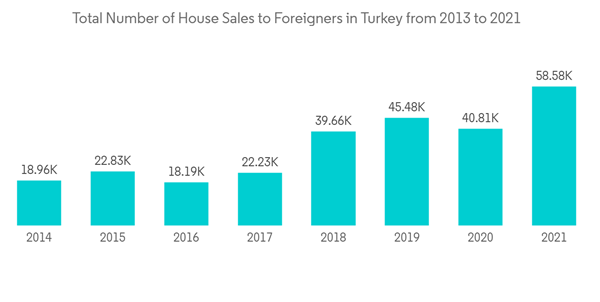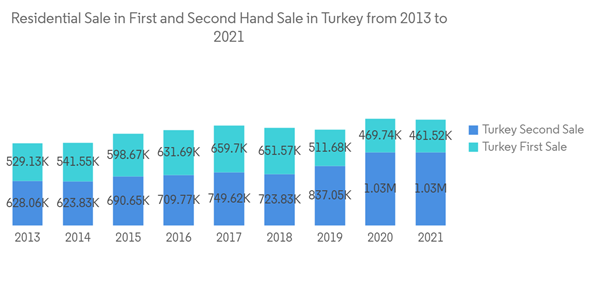During the COVID-19 pandemic, falling interest rates kept the Turkish residential market activity going in 2020. The year saw the biggest number of home sales in history. Rising interest rates resulted in a smaller share of mortgaged sales in the overall total in the first half of 2021 compared to the same period in 2020.
Turkey is an attractive country because of its transportation facilities, tourism, entertainment opportunities, and convention tourism. Istanbul, where Europe and Asia meet, emerges as a haven for real estate investments and is a rising star full of real estate opportunities and stands out as a haven for high value-added and profitable real estate. High-interest rates and economic restraints have had an impact on the economy, and one of the impacts is a decline in real estate prices and a decline in the lira.
The lack of available land for development in city centers, particularly in Istanbul, has forced residential developers to shift toward the periphery with large-scale projects. Mass housing development is also increasing rapidly. The Housing Development Administration (TOKI) is leading mass housing development and regeneration projects, with a focus on providing social housing for low and middle-income households. Improper city planning and poor infrastructure due to rapid urbanization have created a demand for earthquake-resilient homes in Turkey.
According to the Central Bank's House Price Index (HPI), house prices in Turkey grew by 32.39% year-over-year in April 2021 and 28.56% in Istanbul. Inflation reached 17.14% during the same period, while the Turkish Lira depreciated by 19.6% versus the US Dollar, with a 17.6% interest return on one-year deposits. House price increases, which had been trailing alternative investment instrument returns and inflation since the beginning of 2017, surpassed inflation and deposit interest rates in the first half of 2021, as they had done the previous year.
Turkey's overall loan volume declined by 5.07% in the first half of 2021 compared to the same period the previous year, after increasing by 4.03% in 2020. Mortgage rates, which were on the rise in the first half of 2021, were a major contributor to the drop in loan volume. In June 2021, mortgage loans accounted for 7.1% of the total loan volume.
Residential Real Estate in Turkey Market Trends
Increasing FDI Flow in the Residential Real Estate Market in Turkey
The number of house sales to foreigners has accelerated in Turkey due to legislative amendments that eased citizenship with investment limits for foreigners, campaigns launched by real estate developers and banks, and spiking foreign currency that brought an annual record of 78.4% increase in 2021 compared to the previous year.According to official sources, the country's most populous city, Istanbul, has continued to be the top choice for foreign buyers. Residential property sales to foreigners in the city in September 2021 increased by 25% year-on-year to 2995, compared to 2370 in September 2020. On the other hand, when it comes to nationalities, Iranian citizens continue to top the list of foreign buyers of residential properties. Iraq was followed by Iran with 7622 units, Russians with 4494 units, Afghanistan with 2508 units, and Germans with 2062 units in 2021.
Chinese investment in Turkey has increased dramatically, and it is expected to increase in the coming years. They generally invest in luxury properties and beautifully designed five-star managed apartments, with services and excellent facilities.
Decrease in Sales of New Homes in the Residential Segment in 2021
In Turkey, new home sales refer to the first-time sale of a house that was bought through a landownership agreement made between buyers and firms or persons that build the property. New home sales in Turkey averaged 48,758.25 units from 2013 until 2021, reaching an all-time high of 511682 units in 2019 and a record low of 461523 units in 2021.The overall residential sales for Turkey suffered a decline of 21.4% in 2021, compared to the same period of 2019. But the rise in mortgaged sales was 25.3% in the same period. Overall sales and mortgaged sales in the country were -16.2% and 26%, respectively, in the same period. The proportion of first-hand sales in overall sales between 2014 and 2021 declined to 12% - 15%.
Residential Real Estate in Turkey Industry Overview
The residential real estate market in Turkey is fragmented and has a highly competitive environment in order to capture the limited demand between the property owners. Some of the key players in residential construction are Agaoglu Group, Artas Group, Novron, Ege Yapi, and Alarko Holding.Additional Benefits:
- The market estimate (ME) sheet in Excel format
- 3 months of analyst support
This product will be delivered within 2 business days.










